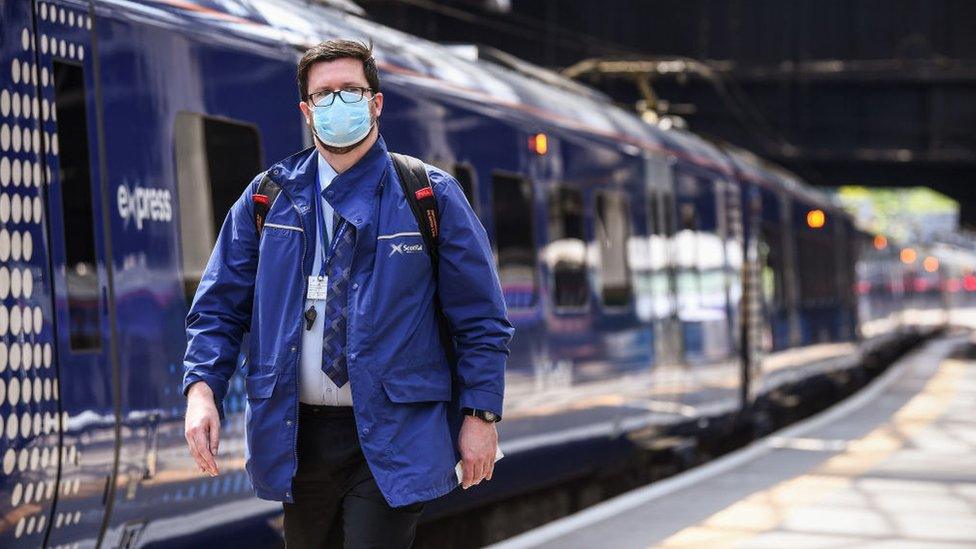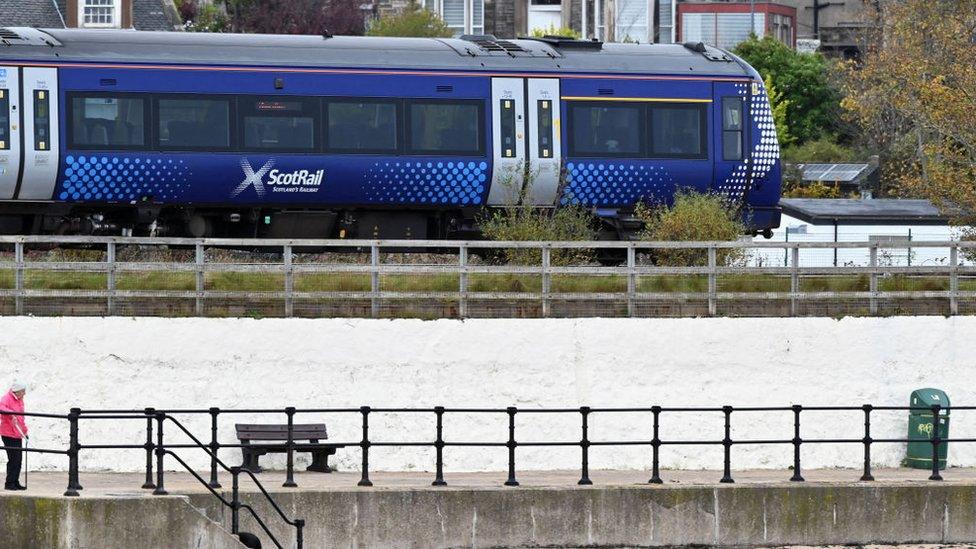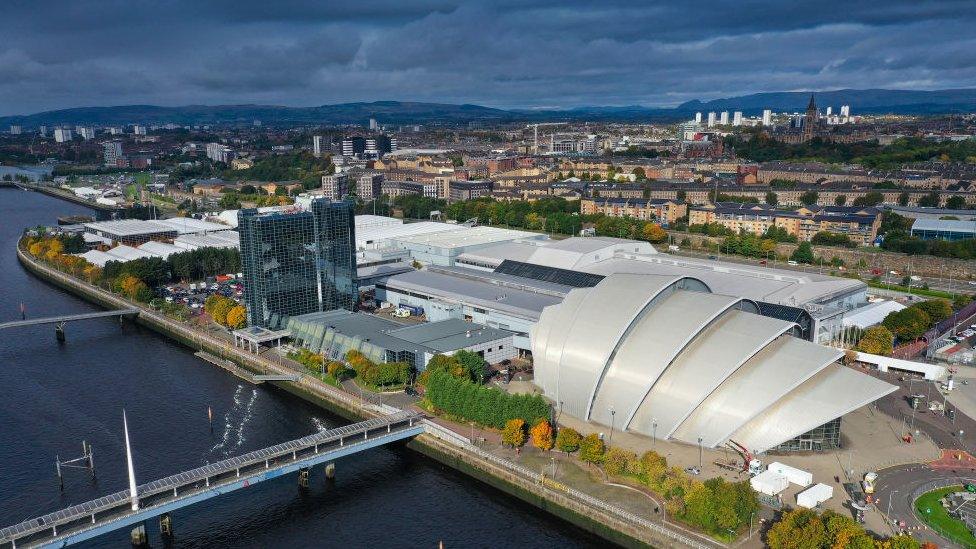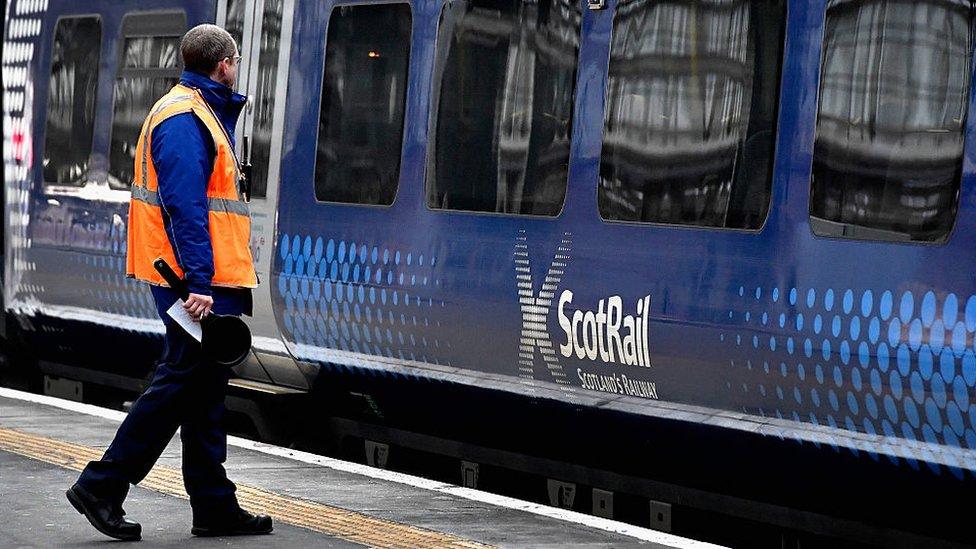Rail strike action during COP26 called off after pay deal agreed
- Published

Strike action which threatened to cripple rail services in Scotland during COP26 has been called off after the RMT accepted a pay deal.
The union said the offer would provide them with a one year 2.5% pay rise, improved conditions and a £300 COP payment for all ScotRail staff.
It also means an end to Sunday strikes which have been ongoing since March.
ScotRail welcomed the agreement, which comes just four days before the start of the UN climate summit.
The Scottish government said it was "proud" to have brokered and funded the deal.
The announcement was made on Wednesday evening following talks between the trade union and transport bosses.
RMT Scotland organiser Michael Hogg told the BBC: "For the first time in eight and a half months, normality returns to Scotland's trains."
'Focus on negotiations'
Speaking on the Good Morning Scotland programme, he said the new deal meant efficiency savings, which had been a sticking point, were off the agenda at least for a year.
"The [original] two-year deal included efficiency savings that were unacceptable to the RMT, so we are happy and delighted that we have been able to secure a one-year deal that allows us to actually focus on negotiations next year," he said.
ScotRail is currently run by Abellio but it is being stripped of its contract amid concerns over its performance. The rail firm will be taken over by a company owned and controlled by the Scottish government in March.
Mr Hogg said the union would be able to return to the negotiating table with a new employer.
"Abellio ScotRail are not going to be there next year," he said. "It is going to be the operator of last resort and I hope the main focus has to be getting our industrial relations back on track in order to have a dialogue next year.
"We are hoping there is going to be a different approach. For the last 18 months negotiations have been protracted and industrial relations have been virtually been destroyed as a result of tactics taken by Abellio ScotRail and Transport Scotland."

Ian McConnell, ScotRail chief operating officer, said: "We have reached a pay agreement with the RMT trade union that resolves strike action.
"We look forward to Scotland's railway playing its part in delivering a successful COP26 next week."
The union had been given until 17:00 on Wednesday to accept the same deal which had been agreed by three other unions.
It then announced ScotRail had accepted a counter offer after the 17:00 deadline.
The union confirmed that planned industrial action, scheduled to start on Monday, would be "withdrawn immediately" as members welcomed a recent agreement on a pay rise.
In a letter sent to union members following talks on Wednesday evening, RMT general secretary Michael Lynch said: "By accepting the offer all industrial action is now cancelled and I instruct you all to work normally on the days you had previously been instructed to take action on."
Mr Lynch said the union's offer was accepted "unanimously" by delegates.

Up to 30,000 delegates are set to descend on Glasgow for COP26
Transport minister Graeme Dey said he was pleased the union reached out to restart discussions based on the offer that had been made to them on Sunday.
He added: "Now an agreement has been confirmed the strike action will thankfully come to an end.
"As well as getting the pay rise they deserve, railway workers can now go back to delivering rail services for people right across Scotland and as well as for those attending COP26."
Up to 30,000 delegates are set to descend on Glasgow for COP26, which runs from Sunday to 14 November.
Another dispute could see thousands of council workers across Scotland including refuse, recycling, maintenance and school catering and janitorial staff taking strike action during the second week of the climate talks.

The COP26 global climate summit in Glasgow in November is seen as crucial if climate change is to be brought under control. Almost 200 countries are being asked for their plans to cut emissions, and it could lead to major changes to our everyday lives.

- Published27 October 2021
